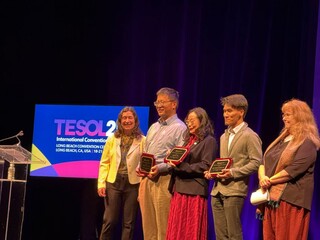BEd (Hons) (Chinese Language) Programme Cultivates Students to be Professional Teachers with Integration of Theory and Practice
- 18 Nov, 2022
- Feature Stories
- Faculty of Humanities
Teachers are the guiding lights of students, but guiding students to study Chinese Language is indeed not easy. Dr Tam Chi-ming, Associate Programme Leader of the Bachelor of Education (Honours) (Chinese Language), believed that being good at subject knowledge is different from knowing how to teach students. Because of this, the programme aims to nurture students into professional and competent Chinese Language teachers through theory and practice.
In order to cater to the need for Chinese Language teaching in Hong Kong, this five-year programme is designed to develop students' knowledge and skills in language, literature, culture and language teaching to build a solid foundation in the Chinese Language for students. Dr Tam asserts that the graduates of this programme have more advantages than the other graduates with Chinese majors. “This programme covers undergraduate knowledge and teaching theory and is taught by the same group of teachers, making it easier for students to adapt to learning,” he explains.
Apart from exploring different pedagogies, students will also study the curriculum and assessment of the Chinese Language in the local primary and secondary schools and understand the current educational issues, such as supporting non-Chinese speaking students in learning Chinese. Besides, the programme also offers related subjects such as “Teaching Chinese as an International Language” as minors, which can complement the knowledge of their majors and prepare them to be future educators. Being one of the professional teaching team members, Dr Tam believes that their teaching team could serve as a good role model for students. “Our teaching team has rich academic knowledge and received qualified training, which has set a good example for students.” In addition to theoretical knowledge, this programme also contains a compulsory Field Experience—the teaching practice that helps students practise the theories learned in the classroom.
Balance Practicality and Fun in Class
The HKDSE Chinese Language exam has been known as the "Paper of Death". Many primary and secondary school students also find learning classical Chinese very challenging. Therefore, how to balance practicality and fun and avoid becoming boring during lessons has become a common challenge for teachers. Dr Tam points out that the key is to clarify the learning objectives:
"Quiet Night Thought is not the best work of Li Bai, but why should we read it?" He explains that teaching is different from literary appreciation. Various literature works help students develop different skills, such as listening, speaking, reading, and writing. The simple example of Quiet Night Thought can help students master the phonology of Tang poetry. "When teachers receive a new chapter as teaching materials, they need to think about using what kind of angle to interpret it in order to achieve the learning goals," he adds.
From this perspective, teaching materials are ubiquitous, ranging from the 12 classical Chinese essays to popular culture, lyrics and anime etc. Analysing the storytelling techniques of films can prove the literary theories. Besides, the lyrics of popular songs can be used to analyse Chinese rhetoric and introduce the popularity of literature. "Some poems are quite ordinary when we read them nowadays, but they became popular because there might have been a need for them in the social culture at that time, just like some current popular songs become famous because of the lyricist." Dr Tam explains.
When it comes to pedagogies, Dr Tam never gets tired of them. He has a wide variety of teaching materials and pedagogies. For example, he can use different situations in anime to teach students “write while walking”, a common writing technique in descriptive writing.
Broadening Horizons via the Immersion Programme on Mainland China
Many schools have gradually introduced the use of Putonghua as the medium of instruction for teaching the Chinese Language subject in their curriculum to cultivate students to become biliterate and trilingual. Therefore, prospective teachers should also be well prepared for that. Dr Tam points out that students are also required to join the Putonghua Immersion Programme at a university on mainland China to improve their spoken Mandarin. Students can understand the local cultural connotation by visiting different historic sites, such as the Chinese garden and the Terracotta Army. They can also experience teaching life on the mainland. With Hong Kong’s greater integration with mainland China, the number of cross-boundary students has significantly increased. Hence, Dr Tam believes that students should expand their horizon. “Our students also need to concern more about education in the Greater Bay Area in the future.”
As the saying goes, “He that travels far knows much”. Dr Tam also encourags prospective teachers to join more overseas exchange activities to broaden their horizons and learn to appreciate the culture and values of different societies. He says many people in Hong Kong think that learning Mandarin and English is difficult. Yet, he takes his student as an example: during the exchange to Europe, the student found that local students had to learn three or four languages at the same time, thus realising that there was no conflict between learning different languages.
Having Qualified Teacher Status in Chinese Teaching with Various Lifelong Skills
There is a huge demand for professional teachers in Hong Kong. Meanwhile, as many people are interested in developing their careers in the education industry, there is also a keen competition in applying for the Postgraduate Diploma in Education. Many people who want to apply for the diploma will first work as teaching assistants in primary and secondary schools to increase their chances of admission. Dr Tam mentions that the BEd(CL) programme takes five years to complete, which requires one year more than the ordinary bachelor's degree in Hong Kong. Upon completion of studies, graduates are eligible to apply to become fully qualified and registered Chinese language teachers in the primary or secondary sector.
Besides, graduates can also develop lifelong skills through this programme, such as communication and team building skills, professional writing skills and the ability to conduct good research. Therefore, Dr Tam believes that graduates will have a diverse career path even if they do not become teachers. They can also be capable of taking up non-teaching positions, such as editing or school administration.






